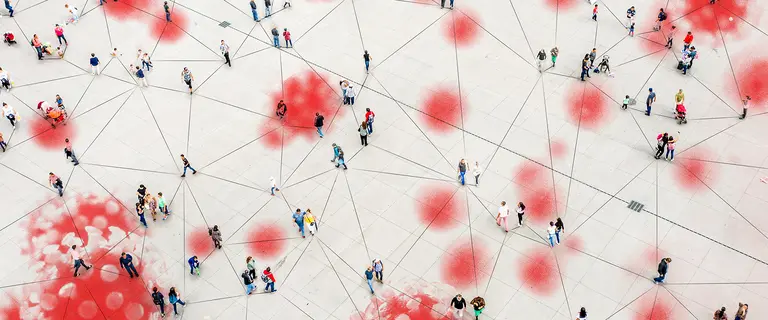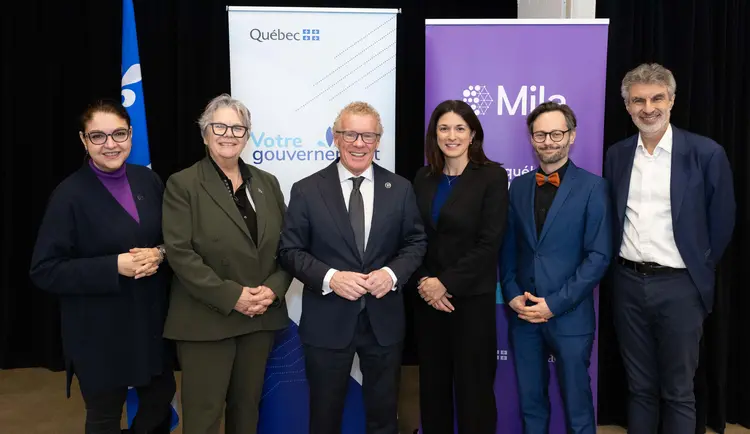
CIFAR unveiled the 14 projects that will receive a grant from the COVID-19 Catalyst Grants, an initiative funded by the Ontario Government, Microsoft Research, the Natural Sciences and Engineering Research Council of Canada (NSERC), Genome Canada,the Max Bell Foundation and many individual donors. Launched on March 23, 2020, the program funds innovative, high-risk, high-reward ideas and projects that address the current COVID-19 outbreak.
Mila's researchers are involved in 5 of the selected projects:
- PanXcea: PANdemic Prediction with X-ray-based COVID-19 External Analysis
- Leveraging Biomedical Knowledge Graphs for COVID-19 Drug Repurposing Strategies
- Modeling the Transmission of SARS-CoV-2 Between Zoonotic Sources on a Gene Level
- Machine Learning Against COVID-19: Accelerating Small Molecule Drug Discovery
- Planning as Inference in Epidemiological Dynamics Models
Collaborators: Marzyeh Ghassemi (Canada CIFAR AI Chair, Vector Institute, University of Toronto), Joseph Paul Cohen (Mila, Université de Montréal), Chris McIntosh (University of Toronto)
Collaborators: Jian Tang (Canada CIFAR AI Chair, Mila, HEC Montréal), William L. Hamilton (Canada CIFAR AI Chair, Mila, McGill University), Yoshua Bengio (Canada CIFAR AI Chair and co-director, CIFAR Learning in Machines & Brains program, Mila, Université de Montréal), Guy Wolf (Mila, Université de Montréal), Yue Li (Mila, McGill University)
Collaborators: Guillaume Rabusseau (Canada CIFAR AI Chair, Mila, Université de Montréal), Vladimir Makarenkov (Université du Québec à Montréal), Bogdan Mazoure (Mila, McGill University)
Collaborators: Sarath Chandar (Canada CIFAR AI Chair, Mila, Polytechnique Montréal), Matthew Taylor (Amii, University of Alberta), Sai Krishna (99andBeyond), Karam Thomas (99andBeyond)
Collaborators: Frank Wood (Canada CIFAR AI Chair, Mila, University of British Columbia), Benjamin Bloem-Reddy, Alexandre Bouchard, Trevor Campbell (University of British Columbia)
Words from the funders
"Our government is exploring every opportunity including critical AI research to combat COVID-19 and to contribute to the worldwide knowledge base on this virus,” says Ross Romano, Ontario Minister of Colleges and Universities. “This new virus requires innovative ways of thinking and solving problems. Our investment will help fund the necessary equipment and lab space to make this AI research possible.”
“The scale and size of the current global pandemic requires a collaborative approach between industry, non-profits, governments, researchers, and clinicians," says John Kahan, Microsoft's chief data analytics officer and Global AI for Health lead. "We’re proud to partner with CIFAR to support the AI and COVID-19 Catalyst Grants Program in the acceleration of COVID-19 related research leveraging our Azure High Performance Computing solutions and Azure compute resources and Data Science team.”
“These grants represent a critical opportunity for interdisciplinary researchers to collaborate on solutions that will support Canadians in their return to everyday life,” says Dr. Alejandro Adem, president, Natural Sciences and Engineering Research Council of Canada. “We are thrilled to partner with CIFAR on this forward-thinking initiative.”
“Genomics allows us to see how the virus works at the molecular level, and today we are able to accumulate sequencing data on a virus such as COVID-19 faster than ever before. The application of AI computational techniques to this data unlocks a new and much deeper understanding of these enormous genomic datasets and opens up tremendous possibility. The projects in the CIFAR AI and COVID-19 Catalyst Grants program initiative are exciting because they demonstrate the transformative impact genomics is starting to have – and will continue to have – on the health care front,” says Dr. Rob Annan, president and CEO, Genome Canada.
“The COVID-19 pandemic has called on all of us to contribute what we can to respond to the crisis and work toward recovery,” says Allan Northcott, president, Max Bell Foundation. “CIFAR has been quick to bring its tremendous research and convening capacity to bear on several fronts, including the launch of its catalyst grants program. Max Bell Foundation is pleased to help support their critically important efforts.”
The COVID-19 Action Fund was launched to support responsive, meaningful actions and collaboration during this unprecedented time. One hundred per cent of donations support initiatives like the AI and COVID-19 Catalyst Grants, that spur innovation and research collaborations. By working together we can accelerate the end of the COVID-19 pandemic. Find out more about the COVID-19 Action Fund and please donate now.





